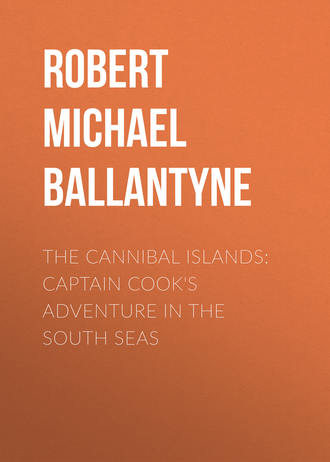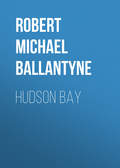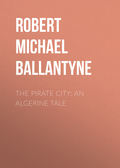
Robert Michael Ballantyne
The Cannibal Islands: Captain Cook's Adventure in the South Seas
Chapter Ten.
Visit to New Zealand
Captain Cook left Tahiti after a stay of three months. During the greater part of this period the sailors and natives had lived together in the most cordial friendship, and in the perpetual interchange of kindly acts. It must be borne in mind that, though the unchristianised natives of the South-Sea Islands are all degraded, cruel, and savage, all are not equally so. Those inhabiting the Feejee group are generally reported to be the worst in all respects. Those who inhabited Tahiti, on the other hand, were, at the time of Cook’s visit, said to be comparatively amiable.
At all events, the departure of the Endeavour called forth a strong display of tender feeling on the part of the natives of that island. In writing of this Cook says—
“On the next morning, Thursday, the 13th July, the ship was very early crowded with our friends, and surrounded by multitudes of canoes, which were filled with natives of an inferior class. Between eleven and twelve we weighed anchor, and as soon as the ship was under sail the Indians on board took their leave, and wept with a decent and silent sorrow, in which there was something very striking and tender. The people in the canoes, on the contrary, seemed to vie with each other in the loudness of their lamentations, which we considered rather as an affectation than grief. Tupia (a chief who had made up his mind to sail with us) sustained himself in this scene with a firmness and resolution truly admirable. He wept, indeed, but the effort that he made to conceal his tears concurred with them to do him honour. He sent his last present, a shirt, to a friend on shore, and then went to the mast-head, where he continued waving to the canoes as long as they were in sight.”
Thus ended the visit of the great navigator to Tahiti, an island which afterwards became the scene of one of the most romantic incidents that was ever recorded in the annals of maritime adventure, namely, the mutiny of the men in H.M.S. Bounty, and the consequent colonisation of Pitcairn Island. Tahiti is now civilised, and under the protective government of the French. The produce of the island is bread-fruit, cocoa-nuts, bananas of thirteen sorts, plantains, a fruit not unlike an apple, which, when ripe, is very pleasant, sweet potatoes, yams, sugar-cane, which the natives eat raw, besides many other kinds of fruits, roots, and vegetables, all of which grew wild when Cook was there, or with so little culture that the islanders are almost altogether exempted from labour.
Setting sail from Tahiti, the Endeavour visited several other isles, and at length arrived at the celebrated island of New Zealand. This is one of the largest in the South Seas, and is now the site of several thriving British settlements. Flourishing cities have been built on its rich soil; large portions of it have been brought under cultivation; gold-mines have been discovered; churches and schools have been erected, and many of the natives have become partially civilised.
Very different indeed was the state of things when Captain Cook first drew near to its shores in the year 1769.
He cast anchor on the 8th of October in a bay near the mouth of a small river about half a league from shore. The sides of the bay were white cliffs of great height, and inland the hills rose one behind another, towering upwards until they terminated in a chain of mountains in the far distance. Some natives had been seen on the beach, so, when the ship was secured, Cook took two of his boats, and, accompanied by Mr Banks and Dr Solander, with a party of men, went on shore. They landed on the east side of the river, but finding it too deep to cross, and seeing some natives on the other side, they took one of the boats—the yawl—and went over, leaving the other boat—the pinnace—behind them.
When the navigators drew near to the place where the natives were assembled, the latter ran away. The sailors then landed, and, leaving four boys in charge of the boat, walked up to some huts which were two or three hundred yards from the beach. But they had not gone far from the water-side when four men, armed with long lances, rushed out of the woods, and ran to attack the boat. They would certainly have succeeded in overpowering the four boys and making off with the boat, had they not fortunately been seen by the people left in the pinnace, who called out to warn the boys of their danger, telling them to push off and drop down stream. The boys obeyed instantly. Being closely pursued by the savages, one of them fired a musket over their heads.
At this they stopped in surprise and looked round them, but in a few minutes renewed the pursuit, brandishing their lances in a threatening manner, as if about to cast them into the boat, which they could easily have done. The boys then fired a second shot over their heads, but of this they took no notice, and one of them lifted his spear with the intention of darting it; another musket was therefore fired, which shot the savage dead. When he fell the other three stood motionless for some time, as if petrified with astonishment. As soon as they recovered they went back to the woods, dragging the dead body, but they soon dropped it and fled when they saw Cook and his companions running to the rescue.
The dead body was examined, and found to be that of a man of middle size, with brown complexion and a tattooed face. He was covered with a kind of native cloth, and wore his hair tied up in a knot on the top of his head. Cook immediately returned to the ship, from the deck of which he could hear the voices of the natives on shore talking with great earnestness and in a very loud tone.
Being anxious to enter into friendly intercourse with these people, Cook renewed the attempt next morning. He ordered three boats to be manned with seamen and marines, and proceeded towards the shore, accompanied by Mr Banks and Dr Solander, also by Tupia, the Tahitan, to act as interpreter. About fifty natives came to the beach and sat down to await their landing. In order to prevent them taking fright, Cook landed first and advanced, accompanied only by the two gentlemen above named and Tupia. But they had not proceeded many paces before the savages started up, and every man produced either a long pike or a small weapon of green talc extremely well polished, about a foot long, and thick enough to weigh four or five pounds. Tupia endeavoured to appease them, but this could not be managed until a musket was fired wide of them. The ball struck the water, and on observing its effect they ceased their menaces.
Meanwhile the marines were landed and marched to a commanding position, where they were drawn up, while Captain Cook again advanced. When they came near enough, Tupia explained that they wanted provisions and water, for which they would give iron in exchange. He then asked them to lay down their arms, but they would not consent to do so. The river still lay between the two parties, and Cook invited the natives to come over and trade. They were unwilling at first, but in a short time one, bolder than the rest, stripped himself and swam over without his arms. He was immediately followed by two or three more, and soon after by most of the others. These last, however, brought their arms with them.
Presents of iron and beads were now made to the savages, but they seemed to care little for these things, and in a few minutes they attempted to snatch the arms out of the sailors’ hands. In this they failed, and Cook ordered Tupia to tell them that if they tried to do that again, he would be compelled to kill them. In a few minutes Mr Green, one of the gentlemen, happened to turn about; immediately one of them snatched away his sword and ran to a little distance, waving it round his head with a shout of triumph. Seeing this, the rest became extremely insolent, and more savages came to join them from the other side of the river. It therefore became necessary to check them, and Mr Banks fired with small-shot at the man who had taken the sword. The shot had only the effect of stopping his shouts and causing him to retire a little farther off, still flourishing the sword, however. Seeing this, Mr Monkhouse fired with ball, and the man dropt instantly. Upon this the main body of the natives, who had retired to a rock in the middle of the river, began to return. Two that were near the man who had been killed ran to the body, and one seized his weapon of green talc, while the other tried to secure the sword, but Mr Monkhouse ran up in time to prevent this. Three muskets loaded with small-shot were then fired at the party, which wounded several, and caused them to retire to the opposite side of the river, after which Cook returned to the ship.
This was a matter of great disappointment to the voyagers, because they were much in want of fresh water. Cook now resolved to seize some of the natives if possible, and prove to them, by kind treatment, that they had nothing to fear. Soon after he had an opportunity of trying this plan. Two canoes were seen coming in from sea; one under sail, the other worked by paddles. Taking three boats full of men he gave chase to them; but the people in the nearest canoe perceived them, and turning aside made with all possible haste for a point of land and escaped. The other canoe was intercepted, and Tupia called to them to come alongside and they would receive no harm; but they took down the sail, took to their paddles, and made off so quickly that the boats could not overtake them. Cook then ordered a musket-ball to be fired over them. On hearing the shots they stopped paddling and began to strip, intending, no doubt, to leap into the sea. But they quickly changed their minds and resolved not to fly but to fight. When the boats came up they began the attack with their paddles and with stones so vigorously, that the voyagers were obliged to fire at them in self-defence. Unhappily four were killed, and the three who remained leaped into the sea.
These were soon captured, and were found to be mere boys—the eldest about nineteen, and the youngest about eleven. Cook deeply regretted this unfortunate affair, and blamed himself for it, but remarked, in justification of himself, that, “when the command has once been given to fire, no man can restrain its excess or prescribe its effect.”
As soon as the poor wretches were taken out of the water into the boat they squatted down, expecting, no doubt, to be instantly put to death. But when they found that instead of being killed they were treated with kindness, they became exceedingly joyful. On reaching the ship they were offered some bread, which they devoured with a voracious appetite. They asked and answered a great many questions, and when the people sat down to dinner expressed a desire to touch and taste everything they saw. The food that pleased them most was salt pork. At night they made a hearty supper, and after they had each drunk above a quart of water, they lay down to sleep on a locker well pleased with their treatment.
During the night, however, their true condition as prisoners seemed to be impressed on them. Possibly they thought of their slain friends, for they began to moan dismally, and it was all Tupia could do to comfort them. Next morning they devoured an enormous breakfast, after which they were dressed, and adorned with bracelet, anklets, necklaces, etcetera, and sent on shore in the hope that they might carry a good report of the strangers to their friends. Nothing came of this, however, at the time. The natives still remained unfriendly, and Cook finally weighed anchor and set sail in search of a part of the coast where the people, it was hoped, would be more hospitable.
Soon after this a number of canoes came off to the ship, and the natives, to the number of fifty, came on board without fear, saying that they had heard such an account of the kindness of the sailors from the three boys, that they had come to trade with them. And they did trade with them, to such an extent that they parted with everything they had, even stripping off their clothes, and offering them in exchange for trinkets of little value!
About an hour before sunset, the canoes put off from the ship to return to shore, and then it was discovered that three natives had been left behind. Tupia hailed the canoes and told them of this, but they would not return; and what seemed more surprising, the three savages did not seem to care but remained on board eating and drinking, and entertaining the ship’s company with dancing and singing of a very remarkable kind, after which they had their suppers and went quietly to bed. But they were dreadfully horrified on awaking next morning to find that the ship was sailing swiftly away with them; and they remained in a state of consternation until a canoe happened to put off from shore, and after much persuasion came alongside and took them away. The men in the canoe were very timid about coming on deck, and they could not be got to do so until the three savages assured them that the white people “did not eat men!”
Cook then continued his voyage of discovery round New Zealand, making careful notes of the coast, and naming the various headlands as he went. As the island is fully as large as Great Britain, it took him some time to accomplish the survey. He had many adventures, and saw many strange things by the way, besides running considerable danger from the natives, who showed themselves extremely hostile.
On one occasion, while they were entangled among some shoals, the hurry on board in working the ship led the savages to suppose the voyagers were alarmed, so taking advantage of this, four large canoes full of armed men put off and came towards them with the intention, apparently, of making an attack. A musket was fired over them, but as it did no harm they continued to come on. A four-pounder, loaded with grape, was then fired a little to one side of them. This caused them all to start up with a shout of surprise, after which they returned quietly to the shore.
On all occasions Captain Cook exerted himself to the utmost to prevent bloodshed; but the natives were everywhere so warlike and treacherous, that this could not always be avoided.
One day several canoes full of armed men came alongside, and were induced to trade—exchanging native cloth and arms for the usual trinkets. Tupia, the interpreter, had a little son with him named Tayeto. This little fellow was employed to stand outside the bulwarks of the ship to hand down the things from the ship to the savages in the canoes. One of these rascals, watching his opportunity, suddenly seized the lad and dragged him down into the canoe. Two of them held him down in the fore part of it, and the others with great activity paddled off—the rest of the canoes following as fast as they could.
Upon this the marines were ordered to fire. The shot was directed to that part of the canoe which was farthest from the boy. One man dropped, upon which the others quitted their hold of the boy, who sprang nimbly into the water and swam towards the ship. A large canoe turned to recapture him, but some muskets and a great gun being fired at it, the rowers desisted from farther pursuit. The ship was immediately brought to, a boat was lowered, and poor Tayeto was picked up, very much terrified, but unhurt, and none the worse for his adventure.
After this the discoverers had the most convincing proof that the inhabitants of New Zealand were cannibals. One day Mr Banks, Dr Solander, Tupia, and others, went ashore and visited a party of natives who appeared to have just concluded a repast. The body of a dog was found buried in their oven, and many provision-baskets stood around. In one of these they observed two bones, pretty cleanly picked, which did not seem to be the bones of a dog. On nearer inspection they were found to be those of a human being. That the flesh belonging to them had been eaten was evident, for that which remained had manifestly been dressed by fire, and in the gristles at the ends were the marks of the teeth which had gnawed them. To put an end to doubt, Tupia asked what bones they were, and the natives answered without the least hesitation that they were the bones of a man, and they had eaten the flesh off them. Upon one of the visitors pretending not to believe this, and saying that they were the bones of a dog, a native seized his own forearm with his teeth and made a show of eating it with great relish. He also took one of the bones which Mr Banks held in his hand and bit and gnawed it, drawing it through his lips, and showing by signs that it afforded a delicious repast!
As if to relieve, somewhat, the feelings of disgust with which they were oppressed by such sights, the voyagers were regaled with the most delicious music on the following morning. About two o’clock they were awakened by the sweet singing of birds, the number of which was incredible, and their energy so great that they appeared to strain their throats in emulation of each other. This wild melody was infinitely superior to anything they had ever heard of the same kind; it seemed to be like small bells most exquisitely tuned;—perhaps the distance of the ship from shore, and the water between, may have lent additional charms to the sound.
Ere long the birds ceased to sing, and the disagreeable subject of the previous day was recalled by the appearance of a small canoe, in which was an old man, who, on coming on deck, at once revived the conversation about eating human flesh.
“But,” said Tupia, after some minutes’ talk, “I did not see any heads of your enemies; what do you do with them? do you not eat them too?”
“No,” replied the old man, “we only eat the brains, and the next time I come I will bring off some of them to convince you that what I have told you is true.”
That same day some of the sailors found on shore near an oven three human hip-bones, which they brought on board, and Mr Monkhouse, the surgeon, discovered and took on board the hair of a man’s head.
Here also they saw practised a remarkably simple and ingenious method of catching fish, which we think might be tried with advantage on our own coasts. Happening to observe a man in his canoe fishing, they rowed alongside and asked him to draw up his line, which he readily did. At the end of it they found a net of a circular form, extended by two hoops about seven or eight feet in diameter. The top was open, and sea-ears were fastened to the bottom as bait. This he let down so as to lie upon the ground until he thought fish enough had assembled over it. Then he drew it up by an extremely gentle and even motion, so that the fish rose with it, scarcely sensible (it is supposed) that they were being lifted, until near the surface of the water, when they were brought out in the net by a sudden pull!
The ingenuity of the New Zealanders appeared in nothing more than in their canoes, of which the following description is in Cook’s own words:
“They are long and narrow, and in shape very much resemble a New England whale-boat; the larger sort seem to be built chiefly for war, and will carry from forty to eighty or a hundred armed men. We measured one which lay ashore at Tolago. She was sixty-eight feet and a half long, five feet broad, and three feet and a half deep. The bottom was sharp, with straight sides like a wedge, and consisted of three lengths hollowed out to about two inches, or an inch and a half thick, and well fastened together with strong plaiting. Each side consisted of one entire plank sixty-three feet long, ten or twelve inches broad, and about an inch and a quarter thick, and these were fitted and lashed to the bottom part with great dexterity and strength. A considerable number of thwarts were laid from gunwale to gunwale, to which they were securely lashed on each side, as a strengthening to the boat. The ornament at the head projected five or six feet beyond the body, and was about four feet and a half high. The ornament at the stern was fixed upon that end as the stern-post of a ship is fixed upon its keel, and was about fourteen feet high, two feet broad, and an inch and a half thick. They both consisted of boards of carved work, of which the design was much better than the execution.”
The smaller canoes, which were of one piece hollowed out by fire, usually had “outriggers,”—boards projecting from, and parallel to, the canoes—to prevent their overturning, and occasionally two canoes were joined together for the same purpose, as, if unsupported, they were extremely liable to upset.
The tools with which these canoes and their other implements and utensils were made consisted of axes and adzes made of a hard black stone, or of a green talc, which latter stone is not only hard but tough. They had chisels made of small fragments of jasper, and of human bones. These also served the purpose of augers for boring holes. Fish-hooks were of bone or shell; these, however, were not well made, but in the fabrication of most of their implements, canoes, war-clubs, baskets, etcetera, they displayed a considerable degree of taste, neatness of hand, and ingenuity.
Our space forbids us following Captain Cook very closely in his many voyages throughout the great archipelago of the South Seas. In this volume we have touched but lightly here and there on the immense variety of subjects which came under his observation. Those who wish for fuller information will find it in the work entitled The Voyages of Captain Cook round the World, which contains his own most interesting journals.
Passing over the years which intervene between the period of which we have been writing and the last voyage he ever made to the islands of the South Seas, we leap at once, in the next chapter, to the sad closing scenes of the great navigator’s career.







